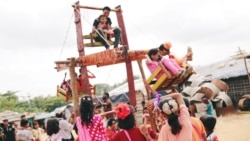Rohingya Broadcast Rohingya “Lifeline” radio - Friday, October 02, 2020 MC & News: Sami Ahmed & Mohammed Hussain \\arsenic\netexchange$\Bangla\MP3 ROH Lifeline 10022020 1130 UTC Intro Today: Friday, October 02, 2020 7:30 a.m. (Washington, D.C., USA) News Headlines Duration: 8 minutes · OIC Ad Hoc Ministerial Committee on Accountability for Human Rights Violations against Rohingya holds consultative meeting in Riyadh · Rohingya Refugees: Allegations of Beating and Torture of Refugees in Bhasanchar, Bangladesh · The Debate Commission is considering new restrictions on the Trump-Biden debate · U.S. lawmakers have warned of China's growing dominance Shortwave: 31-meter band, 9350 kHz; 25-meter band, 11700 kHz and 12030 kHz Medium wave (AM): 1575 kHz Report: VOA News Related item code: 9-P Duration: 5:38 minutes Translator: Sabera Begum (Cox’s Bazar) Topic: Police Break Up Wedding Parties in the Arab World. Translation Summary: In the Arab world, police officers are taking action to control wedding parties. In recent weeks, some weddings have ended with police arresting party goers and giving fines. These moves come at a time when coronavirus cases are rising in the Middle East. Still, many couples are moving forward with their celebrations. In Jenin, in the northern West Bank, Mustafa Khatib and six members of his band spent two nights in jail. They played at a crowded wedding party earlier this month. Police fined the group $11,000. “This is not fair,” said Khatib. “People will never stop getting married and will never stop holding parties.” Palestinian officials have forced many people to suspend ceremonies, said a police spokesman. Yet the punishments, detentions and infections have not stopped people from getting married. “You plan to have a small wedding but then all your relatives and friends show up,” noted Qasim Najjar. “This is our custom.” Najjar himself was recently married in the northern West Bank village of Deir Sharaf. The wedding party was broken up by police. Report: VOA News Related item code: 9-P Duration: 9:55 minutes Interviewer: Hamid Hussain (VOA Rohingya Lifeline reporter) Guest: Mohammed Asem @ U Tin Maung A Rohingya retired schoolteacher, historian, and writer Based in Yangon, Myanmar Topic: Short History of Rakhine State and the Origin of the Rohingya Muslims Translation Summary: Mohammed Asem told VOA Rohingya Lifeline that Rohingya are not migrated from Bangladesh, but they are Indo-Aryan ethnic group who have resided in Arakan state century after century. Indo-Aryan ethnic group originally came from India through Ganga, Mizzima, Bengal to Arakan state who predominately followed Hinduism and later they converted to Buddhism and then from Buddhism to Islam. Shandra king ruled the Arakan state during Danyawaddi, Weethalle and Parin period. The term "Rohingya" may come from Rakhine or Rakhanga, the words for the state of Rohang, in Bengal they used pronounce Rohang/Roshang. The word Rohingya would then mean "inhabitant of Rohang", which was the early Muslim name for Arakan. The Rakhine Buddhist are descendants from Mongolian, their skin color is fair, and nose flattened but Rohingya are descendants from Indo-Aryan, their skin color is dark/brown. Many ethnic groups residing in both sides west and east, it does not matter which country he-she belong to (west is today Bangladesh), (east is today Rakhine state). According to Arabic term “Arakan” literally meaning five pillars of Islam ( Rukun ), Indian, Persian, and Arab people are used to call Arakan, now is Rakhine. Apparently, Rakhine people also use the term “Arakan” instead of Rakhine, which is used to call early ruled by Muslim kingdom of Arakan. He added, in speech of Prime Minister U Nu by cabinet decision delivered on (09/25/1954) stated that the Rohingya residing within Buthitaung, Maungtaw regions were Muslims. U Ba Swe, Deputy Pri
খন্ড
-
![]() জানুয়ারী ১৫, ২০২৬
জানুয়ারী ১৫, ২০২৬Rohingya Broadcast
-
![]() জানুয়ারী ১৪, ২০২৬
জানুয়ারী ১৪, ২০২৬Rohingya Broadcast
-
![]() জানুয়ারী ১৩, ২০২৬
জানুয়ারী ১৩, ২০২৬Rohingya Broadcast
-
![]() জানুয়ারী ১২, ২০২৬
জানুয়ারী ১২, ২০২৬Rohingya Broadcast
-
![]() জানুয়ারী ০৯, ২০২৬
জানুয়ারী ০৯, ২০২৬Rohingya Broadcast
-
![]() জানুয়ারী ০৮, ২০২৬
জানুয়ারী ০৮, ২০২৬Rohingya Broadcast







